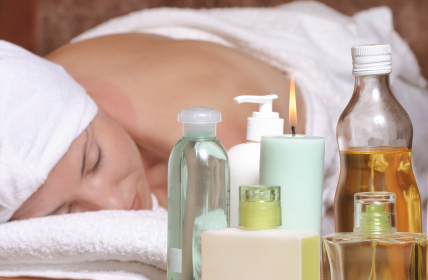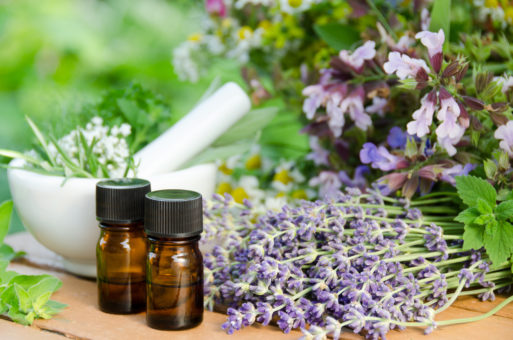Today SevenPonds completes our two-part interview with Nyssa Hanger, an aromatherapist from Tampa, Florida. (Read part one here.) Nyssa is a self-employed masseuse and essential oils expert. She is also the founder of Upward Spiral, where she helps clients heal through aromatherapy and massage. Her backgrounds in holistic healing, aromatherapy and spiritual studies have helped her to change the lives of many clients struggling in areas including death and loss.

Credit: www.libertastherapy.co.uk
Kristen: Can you discuss briefly how you conduct a typical aromatherapy session?
Nyssa Hanger: I usually implement aromatherapy into the context of massage. I combine massage oil with an essential oil that I believe will be most beneficial for the client. For example, if someone is struggling with a breakup, I will use lavender oil, which is a very nurturing scent that promotes a calming effect and works to ease anxiety and depression. If someone comes in complaining about how busy and run-down they are, I might use jasmine, which helps stimulate brain waves and enhance mental alertness. Most of the time, I will have something already in the diffuser for recurring customers.
My sessions last for about an hour and a half, depending on how much work I feel the client needs. I spend a bulk of the time working on releasing tension in the cranium and testing the muscles using a technique called muscle monitoring. Surprisingly, the muscles in our bodies react differently to certain scents. By using muscle monitoring, I can tell what scents the person needs in order to feel better.
I learned this method from reading Robbi Zeck’s book “The Blossoming Heart,” which explains the use of scented oils to shift emotions from negative to positive. Zeck also discusses the importance of sound in conjunction with scent. Sometimes I will take his book to a session and recite some of his reflections. Much more often than not, clients who actively participate in aromatherapy can move from an unfulfilled state to one of serenity.
Kristen: What do you feel is the most rewarding aspect of being an aromatherapist?
Nyssa: I love teaching people about the benefits of aromatherapy and helping others to heal themselves. Aromatherapy isn’t about essential oils — they are just the vehicles we use to reach rejuvenation. Aromatherapy is about bringing a person back to themselves. It’s about helping someone to maintain a healthy and happy state of mind in a natural way, which is the heart of holistic therapy. It shows others that you can heal yourself, or at least lighten the effects of grief. You just have to keep your mind on the bigger picture.

Credit: www.anewpathwaytohealth.com
Kristen: What is the hardest aspect?
Nyssa: I have to stay on my self-care game if I want to do a good job with my clients. They say that “every good therapist has their own therapist,” and I completely agree with that. In a similar way, I need to keep track of my own mental and physical health. Even though it can be hard to care for myself while running two businesses and fulfilling other family commitments, it is an essential part of my practice to make sure I feel well in order to help others feel well. I will go for aromatherapy massages myself when I am feeling sick or run-down.
Kristen: Do you participate in making any of the aromas that you use during your practice?
Nyssa: That is a good question! In short, no. Most essential oils come from large scale farming. I buy the oils in bulk, and then I make my own blends. I combine the essential oils with carrier oils, otherwise known as fatty oils, and then dilute them.
It is a common misconception that carrier oils are synonymous with essential oils. Essential oils are derived strictly from aromatic plant extract — from the non-fatty parts of a plant such as the bark, roots, stem or leaves. They are highly potent, which is why they need to be diluted with carrier oils, and are usually thinner than carriers. While carrier oils also come from plants, they are pulled from the fattier parts, such as the seed, kernels or nuts. They are thicker than essential oils and are not very potent or concentrated.
Kristen: Lastly, do you have any advice for those who are currently dealing with the death of a loved one?
Nyssa: It can be easy to forget about yourself when taking care of someone who is sick or dying. Don’t forget about your own self-care. Always attend to your personal needs while taking care of others.

 What is Aromatherapy and How Can It Help Those Facing Death? An Interview with Nyssa Hanger
What is Aromatherapy and How Can It Help Those Facing Death? An Interview with Nyssa Hanger


 “Help Me, Helen”
“Help Me, Helen”
 Recovering Cremation Remains After the Los Angeles Fires
Recovering Cremation Remains After the Los Angeles Fires
 “As Tears Go By” by Marianne Faithfull
“As Tears Go By” by Marianne Faithfull














